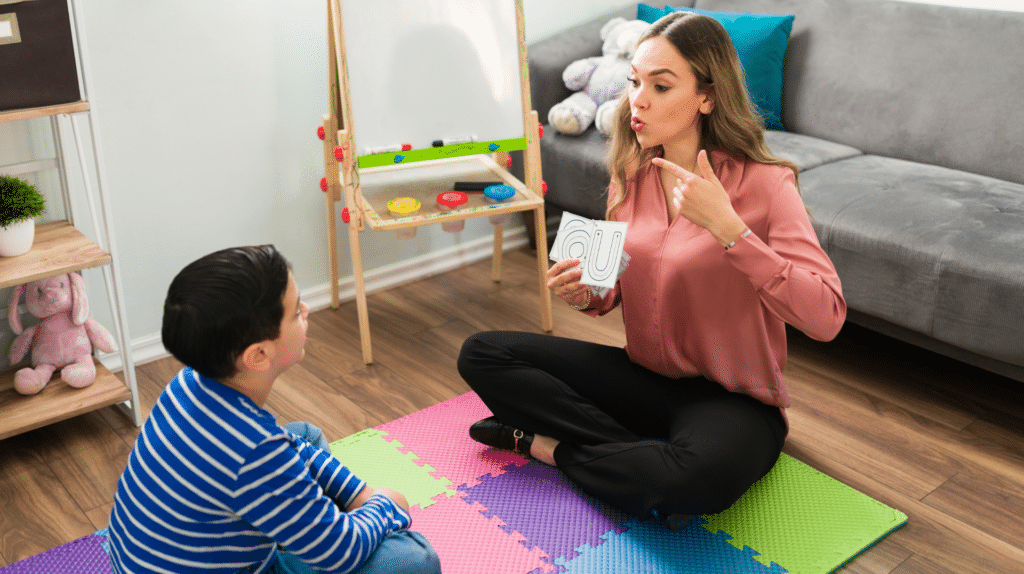Understanding Language Milestones

Understanding Language Milestones in Children: A Guide for Parents and Caregivers
Let’s talk about language! While often used interchangeably with speech, the two are distinct. Speech refers to the physical act of producing sounds and forming words, while language is how we communicate and use words to share ideas, thoughts, and feelings. Language development is one of the most exciting aspects of a child’s growth, and as a speech-language pathologist (SLP), I often hear parents ask, “Is my child’s language development on track?” While each child develops at their own pace, there are general milestones that can help guide expectations. Below, I’ve outlined key language milestones by age and practical ways parents can support their child’s communication skills.
Birth to 12 Months: Foundations of Communication
During the first year of life, babies focus on building the foundations of language through listening, observing, and engaging with their environment.
Milestones:
- 0-3 months: Coos, gurgles, and turns towards sounds.
- 4-6 months: Begins to babble (e.g., “ba-ba”), and responds to tones of voice.
- 7-12 months: Says first words (often “mama” or “dada”) and understands basic words like “no” and “bye-bye.”
How to Help:
- Talk, sing, and read to your baby daily.
- Mimic their sounds to encourage back-and-forth “”
- Narrate daily activities to build vocabulary exposure.
1 to 2 Years: First Words and Early Sentences
This stage marks rapid growth in expressive language, where toddlers learn to label and request.
Milestones:
- Uses 50+ words by age 2.
- Combines two words to form simple sentences (e.g., “Want cookie”).
- Follows simple directions like “Come here” or “Get your shoes.”
How to Help:
- Use simple, clear language when speaking to your child.
- Offer choices to encourage decision-making and vocabulary use (e.g., “Do you want the red ball or the blue ball?”).
- Expand on their words: If they say “ball,” respond with “Yes, that’s a big red ball!”
2 to 3 Years: Expanding Vocabulary and Grammar
By age 3, many children experience a “language explosion” as they rapidly learn new words and grammatical structures.
Milestones:
- Vocabulary grows to 200+ words.
- Forms three- to four-word sentences (e.g., “I want more juice”).
- Begins to ask “what” and “where”
- Understands concepts like “big/little” and “honest/false.”
How to Help:
- Play pretend games to encourage storytelling and conversation.
- Read books with repetitive phrases to reinforce language patterns.
- Be patient and listen to your child’s attempts to communicate, even if their grammar isn’t perfect.
3 to 5 Years: Storytelling and Social Skills
During the preschool years, children become little storytellers and conversationalists.
Milestones:
- Uses complete sentences with 4+ words.
- Can recount simple stories and events.
- Understands and uses basic prepositions (e.g., “on, in, under”).
- Begins to understand time concepts like “yesterday” and “tomorrow.”
How to Help:
- Ask open-ended questions like “What did you do at school today?”
- Encourage turn-taking in conversations and games.
- Introduce new vocabulary through books and experiences.
When to Seek Support
While variations in language development are normal, some signs may indicate a need for professional support. Consider consulting an SLP if your child:
- Has fewer than 50 words by age 2.
- Is difficult to understand for their age.
- Doesn’t respond to their name or simple directions.
- Shows frustration during communication attempts.
Final Thoughts
You’ve got this, parents! Remember, language isn’t one-size-fits-all! Language development is a journey that involves consistent interaction, patience, and encouragement. By understanding these milestones and actively engaging with your child, you can create a strong foundation for their communication skills. If you ever have concerns about your child’s progress, don’t hesitate to reach out to an SLP—we’re here to help!
Kaleigh A. Campbell, M.S., CCC-SLP
